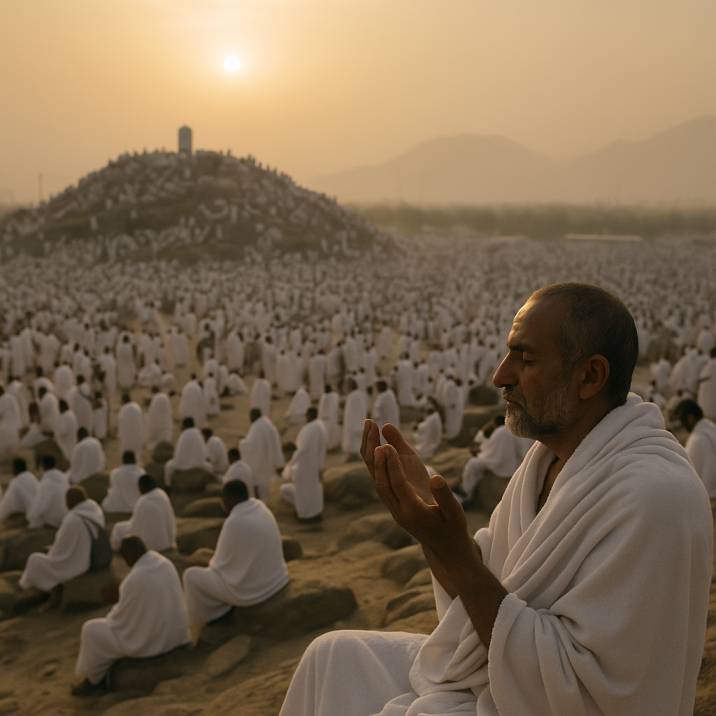The Inner Journey of Hajj: How the Pilgrimage Transforms the Soul

Each year, millions of Muslims gather in the holy city of Makkah to fulfill one of Islam’s most sacred obligations—Hajj. While the pilgrimage is often viewed through its physical and logistical demands, the most profound changes occur within. The inner journey of Hajj is one of spiritual awakening, a path marked by patience, humility, and gratitude. Through the physical trials of this sacred ritual, pilgrims undergo a transformation that lingers long after they return home.
What Is the Inner Journey of Hajj?
The spiritual essence of Hajj goes beyond the rites of Tawaf, Sa’i, and standing at Arafat. It is a deeply personal expedition toward self-purification. As pilgrims engage in the same actions performed by Prophet Ibrahim (AS), Hajj becomes a mirror—reflecting one’s intentions, ego, and capacity for submission.
Pilgrims relinquish worldly comforts and face extreme physical conditions. This process is designed to break down the barriers between the self and the divine. In this sacred state of Ihram, distinctions of wealth, race, and nationality disappear, emphasizing the equality and unity of all believers before Allah (SWT).
Lessons from the Physical Challenges of Hajj
1. Patience Through Waiting and Walking
Long queues, tight crowds, and seemingly endless walks under the scorching Arabian sun test even the most composed individual. Pilgrims learn that they must surrender to the moment, to the divine timing of Allah. This cultivates deep patience and resilience.
“Indeed, Allah is with those who are patient.” (Qur’an 2:153)
2. Humility Through Simplicity
Wearing the unstitched white garments of Ihram symbolizes the stripping away of social status. Regardless of title or background, every pilgrim is equal. Living in basic conditions and sleeping beside strangers reinforces humility—reminding us of our shared humanity and mortality.
3. Gratitude Amidst Hardship
The discomforts of Hajj—heat, exhaustion, dehydration—make pilgrims grateful for everyday blessings. Water tastes sweeter. A patch of shade becomes a gift. Each hardship faced brings new appreciation for life’s small mercies.
The Spiritual Peak: Standing at Arafat
The most spiritually intense moment of Hajj is the Day of Arafat. Pilgrims gather in silent supplication, repenting and pleading for mercy. This is the heart of the inner journey—a soul standing exposed before its Creator, hoping for renewal. Many describe this moment as life-changing, feeling an overwhelming closeness to Allah.
Reliable Data for Pilgrims
Stay connected across Makkah, Mina, Arafat, and Madinah—no roaming stress.
Post-Hajj Transformation: Taking Lessons Home
Once the rituals are complete and the journey ends, pilgrims return not just physically tired but spiritually awakened. The inner transformation manifests in many ways:
- Greater empathy for others
- Increased reliance on prayer and trust in Allah
- Simplification of lifestyle and priorities
- Newfound gratitude for health, time, and faith
Many Hajjis describe this transformation as a “rebirth,” emerging not just as someone who completed a journey, but someone who has been changed by it.
Staying Connected During Hajj Without Distractions
While Hajj is a time for spiritual focus, staying connected with loved ones or accessing travel essentials is also important—especially in emergencies or while coordinating group travel. But how can pilgrims manage connectivity without letting technology disrupt their experience?
Enter: Voye Global eSIM for Hajj
Voye Global offers an elegant solution for staying connected during Hajj. Designed for international travelers, the Voye Global eSIM ensures pilgrims can communicate easily, navigate digitally, and access essential services—all without swapping SIM cards or dealing with unreliable roaming charges.
Why Choose Voye Global eSIM for Your Hajj?
- Instant activation on arrival in Saudi Arabia
- No physical SIM card required—just scan and connect
- Affordable data plans tailored for pilgrims
- Reliable coverage across Makkah, Mina, Arafat, and Madinah
- Perfect for maps, translator apps, emergency contact, and group chats
With Voye Global, you can focus on your spiritual experience while staying effortlessly connected.
How to Use Voye Global eSIM During Hajj:
- Choose your Hajj eSIM plan from Voye Global’s Saudi Arabia plans.
- Install the eSIM on your phone before travel or upon arrival via QR code.
- Connect to local networks instantly—no kiosks, no wait, no hassle.
- Use your data for navigation (e.g., Google Maps), translation, Duas, and staying in touch with family.
Final Reflections: Hajj Is Not Just a Journey—It’s a Rebirth
Every step of Hajj challenges the body, but heals the soul. It is not just the rituals, but the resilience forged in hardship that changes the pilgrim. From walking barefoot on hot stones to praying beside millions of strangers, the pilgrim is gently stripped of ego, awakened to gratitude, and drawn closer to Allah.
In this sacred test lies a profound truth: the path to the Divine is not paved in comfort, but in surrender.
Stay Connected Without Losing Focus
Spiritual clarity doesn’t mean digital disconnection. Let Voye Global support your Hajj journey with seamless, reliable, and affordable eSIM solutions—so your focus stays where it matters most.
Peace of Mind While You Pray
Navigate, call, and share safely during your Hajj with instant mobile data.
Frequently Asked Questions (FAQs)
1. What is meant by the ‘inner journey’ of Hajj?
The inner journey refers to the emotional and spiritual transformation that takes place during Hajj. It’s a time for self-reflection, repentance, gratitude, and a renewed connection with Allah beyond the physical rituals.
2. How does Hajj strengthen one’s relationship with Allah?
Hajj provides time and space for uninterrupted worship, sincere dua, and detachment from worldly distractions. This focused spiritual environment fosters humility, submission, and a deeper sense of tawheed (oneness of God).
3. What emotional changes do pilgrims commonly experience during Hajj?
Many first-time pilgrims report feeling awe, overwhelming gratitude, humility, inner peace, and even tears of joy. These emotions stem from witnessing the sacred sites, engaging in communal worship, and reflecting on life’s purpose.
4. How can I prepare spiritually before going for Hajj?
Begin by purifying your intentions, increasing your prayer and Qur’an recitation, making amends with others, and learning the significance of each ritual. Journaling your goals for Hajj can also help keep your focus inward.
5. Is it normal to feel emotional exhaustion during Hajj?
Yes, both physical and emotional fatigue are common. The key is to stay spiritually grounded, take breaks when needed, and remember that even small efforts are rewarded during Hajj.
6. How can I hold on to the spiritual growth after returning from Hajj?
Maintain the habits you developed—regular salah, dua, dhikr, patience, and charity. Stay connected to a local faith community and revisit your Hajj reflections often to renew your purpose.
7. Can the spiritual benefits of Hajj be experienced through technology (e.g., online videos, apps)?
While nothing replaces the physical experience, spiritual tools like apps, e-books, and live Hajj broadcasts can inspire spiritual growth and reflection before or after your pilgrimage.
8. Why is humility considered the core spiritual value during Hajj?
Hajj strips away worldly identities—everyone dresses the same, performs the same rituals, and stands equally before Allah. This deeply instills humility and the realization that we are all servants of the same Creator.
9. How can I stay connected during Hajj without distractions?
Staying connected during Hajj is important for safety and communication, but it’s vital to strike a balance. Using a prepaid travel eSIM for Hajj lets you access essential apps like Quran readers, dua guides, maps, and group chats—without the hassle of roaming or SIM swaps. Choose a reliable eSIM with stable coverage in Makkah, Mina, and Arafat so you can stay focused on your spiritual journey while staying connected when truly needed.








